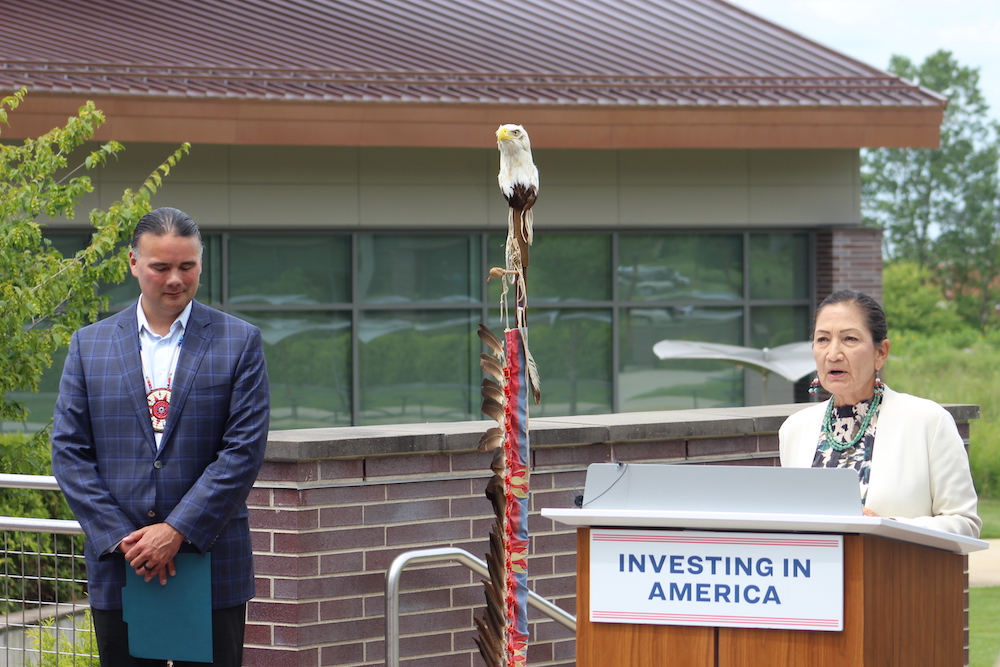
- Details
- By Chez Oxendine, Levi Rickert
Interior Secretary Deb Haaland (Laguna Pueblo) announced a new $120 million funding opportunity for tribes during a visit to the Match-E-Be-Nash-She-Wish Band of Pottawatomi Indians, known as the Gun Lake Tribe, in southwest Michigan.
The Tribal Climate Annual Award, part of the Bureau of Indian Affairs’ Tribal Climate Resilience Program, will open July 17, with the solicitation continuing through Oct. 18 of this year. The funding will help tribes with planning and implementation of strategies meant to quickly save community infrastructure amid climate disasters.
The $120 million funding matches last year’s amount, which supported an array of projects and infrastructure improvements, such as relocations for Alaska Native villages and housing planning for the Hoh tribe in Washington. In the wake of the Inflation Reduction Act (IRA) passed in 2022, funding for the program jumped from a total of $110 million for the years 2011-2022 to $120 million in 2023.
“As I’ve visited Indigenous communities across the country, I have seen firsthand how pressing the climate crisis is for Indigenous peoples and the urgency with which we must move to honor our obligations to Tribal Nations,” Haaland said at Gun Lake on Tuesday. “This investment through President Biden’s Investing in America agenda is a critical step toward further enabling Tribes to make thoughtful and proactive decisions about how to protect their people, their homelands and sacred sites, and critical community infrastructure.” \
During the visit, Haaland referenced a $4 million grant the Gun Lake Tribe received this April that will allow the tribe to implement its electric infrastructure project, including vehicles for its gaming facility and public safety department, and solar panel installations. “That’s one way they're working to address the climate crisis and be part of our community energy future. I encourage all of you to learn about their efforts,” Haaland said.
Haaland’s announcement today is part of an overall $560 million investment by the Biden administration for tribal climate resilience programs through the Bipartisan Infrastructure Law (BIL) and IRA. She emphasized that the administration, including the Interior Department, believes tribal leaders know best how to serve their own people.
“Under President Biden’s leadership and with the amazing people of the Interior Department and across the federal family, we’re making up for significant and systemic underfunding of tribal communities through the decades,” Haaland said.
Also on hand at the event was Assistant Secretary of Indian Affairs Bryan Newland (Bay Mills Indian Community), who previously served as president of his tribal community in northern Michigan. He welcomed Secretary Haaland to his homelands.
Newland said the Bureau of Indian Affairs (BIA) stands ready to provide technical assistance to tribes who may apply for climate funds announced on Tuesday.
“This administration is committed to ensuring that Indian Country has every resource it needs to thrive and support families and businesses,” Newland said.
Gun Lake Tribe Chairman Bob Peters assured that the tribe will make the best and most responsible decisions in using the funding to benefit the tribe’s citizens.
“I want you to know that we take a serious approach to our responsibility to administer tribal climate resilience. We will use the funds appropriately with the guidelines of the grant program. The tribal council has been active in discussions without government staff and play to use these funds so we can maximize a positive impact,” Peters said.
Director of the White House Domestic Policy Council Neera Tanden highlighted the partnership between the administration and tribal leaders.
“I think this project we heard about today at Gun Lake just really demonstrates the power of the partnership between the Biden administration and tribal leaders,” Tanden said. “It is really a win-win-win of our climate investments and the Investing in America agenda (for) addressing our climate challenges, creating new jobs, and also lowering the costs of energy.”
Help us defend tribal sovereignty.
At Native News Online, our mission is rooted in telling the stories that strengthen sovereignty and uplift Indigenous voices — not just at year’s end, but every single day.
Because of your generosity last year, we were able to keep our reporters on the ground in tribal communities, at national gatherings and in the halls of Congress — covering the issues that matter most to Indian Country: sovereignty, culture, education, health and economic opportunity.
That support sustained us through a tough year in 2025. Now, as we look to the year ahead, we need your help right now to ensure warrior journalism remains strong — reporting that defends tribal sovereignty, amplifies Native truth, and holds power accountable.
 The stakes couldn't be higher. Your support keeps Native voices heard, Native stories told and Native sovereignty defended.
The stakes couldn't be higher. Your support keeps Native voices heard, Native stories told and Native sovereignty defended.
Stand with Warrior Journalism today.
Levi Rickert (Potawatomi), Editor & Publisher
